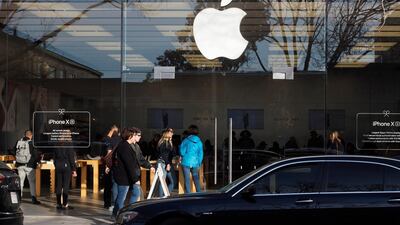Apple’s holiday sales decline reflected the iPhone maker’s lost ground in China amid an economic slowdown in the world’s second-largest economy.
Chief executive Tim Cook has seen China as a key part of Apple’s sales and manufacturing strategy, with the company generating almost $52 billion in revenue from China and Hong Kong last fiscal year, according to Bloombrg. But with China announcing its slowest economic growth since 2009, Apple said its sales fell 27 per cent in the holiday quarter - representing almost $5bn of lost revenue.
“Weak macro conditions in some emerging markets was significantly more severe than we originally foresaw, especially in Greater China," Mr Cook said.
Apple plans to cut the price of some of its flagship iPhones for only the second time in the device's 12-year history, pegging its retail value to past prices in local currencies outside the United States instead of the rising US dollar, Reuters reported. The move is an attempt to stem weak sales of the iPhone, particularly in overseas markets such as China, where a 10 per cent rise in the US dollar over the past year or so has made Apple's products - which already compete at the top end of the market - much pricier than rivals.
Apple isn’t the only hardware maker with China woes. Chipmaker Nvidia forecast a weakened sales outlook because of falling demand for its gaming processors in China and Intel Corp. cited the Chinese economy as a reason for its lacklustre forecast.
In addition to the economic pinch, Chinese consumers are increasingly turning away from Apple’s high-priced phones to less expensive domestic models from Huawei Technologies and Xiaomi.
“Global iPhone shipments fell sharply, due to high retail pricing, unfavourable foreign exchange rates, intense competition from rivals like Huawei, battery replacement programmes driving longer ownership cycles, diminished carrier subsidies in some developed markets, and flagging demand in some emerging markets,” Neil Mawston, an analyst at Strategy Analytics, wrote in a note.
Apple has tried to replace phone sales with services revenue to compensate for the loss. To that end, Mr Cook said services revenue in Greater China increased by more than 50 per cent. Despite the gain, the Chinese government’s censorship of video games “affected” Apple’s business in the country, chief financial officer Luca Maestri said. He called the challenge “temporary in nature” but analyst Neil Campling of GTS Group noted that there were no game approvals in China between March and mid December.
There were a couple bright spots for Apple’s business in China: two-thirds of those customers who purchased a Mac computer or iPad during the quarter were first-time buyers for the products, the company’s executives said. Mac revenue grew 9 per cent, while iPad sales climbed 17 per cent. The company’s Wearables business, which includes the Apple Watch and AirPods, surged 50 per cent.
Still, the iPhone remains the centrepiece of Apple’s product lineup, so some analysts remain disappointed by the company’s performance in a crucial market for growth.
“Apple iPhone has an Asia problem,” Mr Mawston wrote.
Apple shares rose 5.5 per cent in the US in extended trading on Tuesday. The company had lost about a third of its market value since October as investors adjusted to the reality of a saturated smartphone market and the end of growth for Apple’s most-important product.

